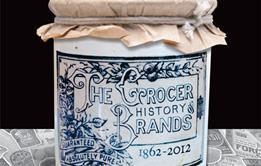lthough vast numbers of Britons remained below the poverty line, living standards for employed workers had greatly improved by the 1900s.
Consumer goods were increasingly a means of displaying wealth, and consumption was on the up. Britain’s annual appetite for tea had grown from 1.6lb per head in 1846 to 5.7lb in 1890 - and sugar consumption had risen from 24lb a year to 80lb.
Many new brands, such as Fry’s Five Boys (1902) and Cadbury Dairy Milk (1905), were nice-to-haves rather than essentials. Irn-Bru (1901) was invented to give the men rebuilding Glasgow’s Central Station a safer alternative to beer - and Perrier (1903), Fentimans (1905) and Vimto (1908) also launched, although the latter was named Vimtonic until 1912. Breakfast cereals arrived, too, including Force toasted wheat flakes (1902) and Shredded Wheat (1908).
Britain continued to invest in developing its international presence, a move away from the ‘splendid isolationism’ that had latterly defined foreign policy. In 1902, the Anglo-Japanese Alliance was signed in London. The first transatlantic radio message was broadcast the next year - and the Entente Cordiale with France was signed in 1904.
Trade was particularly important. In 1900 and 1901, treaties were signed with the US to build shipping canals through Nicaragua and Panama,respectively. But it was in exploration that Britain was really pushing boundaries. Scott set out for Antarctica in 1901, and Shackleton followed seven years later.
Industry continued to swell - according to the census of March 1901, there had never been more people employed in manufacturing. Although cars were still relatively rare, the automobile was on the rise. In January 1904, car licensing and number plates were introduced, as was a speed limit of 20mph - and the Automobile Association was founded the followingyear.
As the women’s lib movement started to take off - the first Suffragette protest took place in May 1905 - household management was becoming easier thanks to NPD and new technology. Famous brands such as Vim (1904), Brasso (1905) and Persil (1909) emerged during the decade, while the electric vacuum cleaner was patented in 1901 - and the Ideal Home Exhibition was held for the first time in 1908.
History of Brands

What is a brand? Why do brands exist? Laura Evans lifts the lid on how brands began - and how they’ve changed.
- 1
- 2
- 3
- 4
- 5
- Currently reading
History of brands: the 1900s
- 7
- 8
- 9
- 10
- 11
- 12
- 13
- 14
- 15















No comments yet